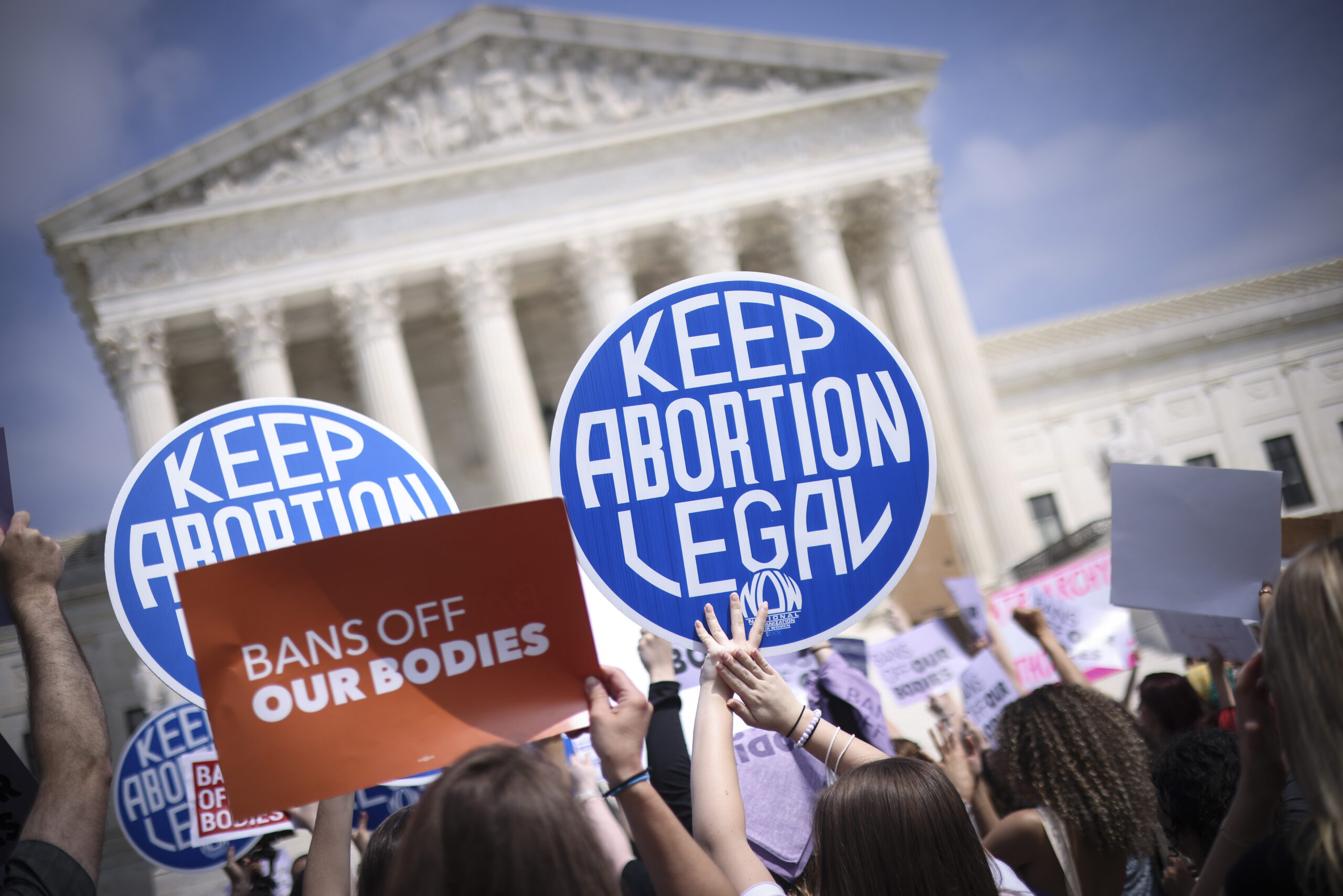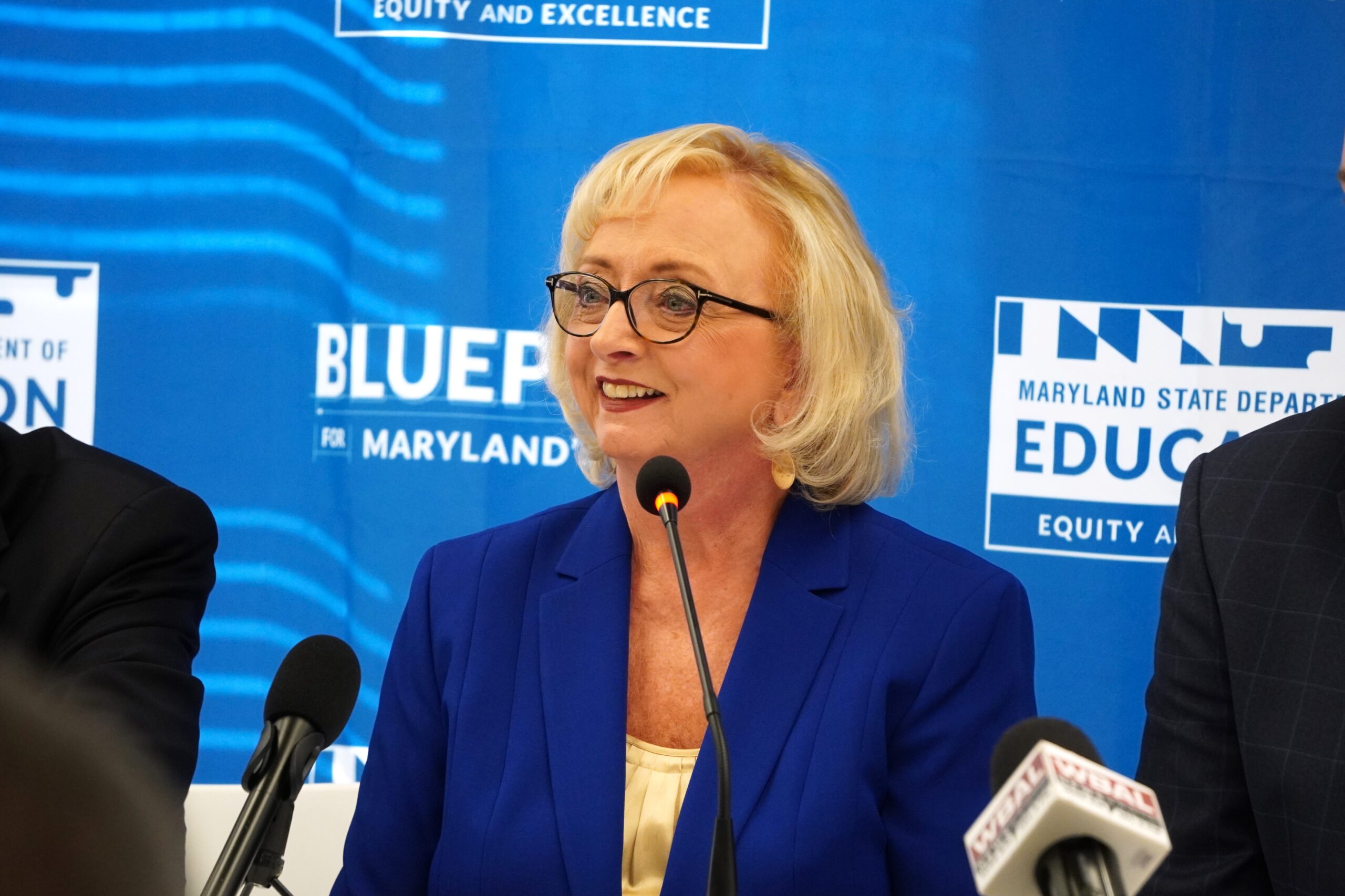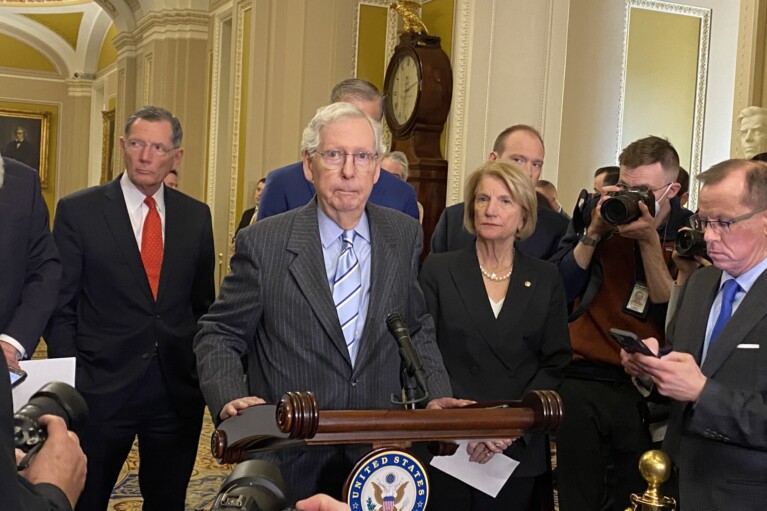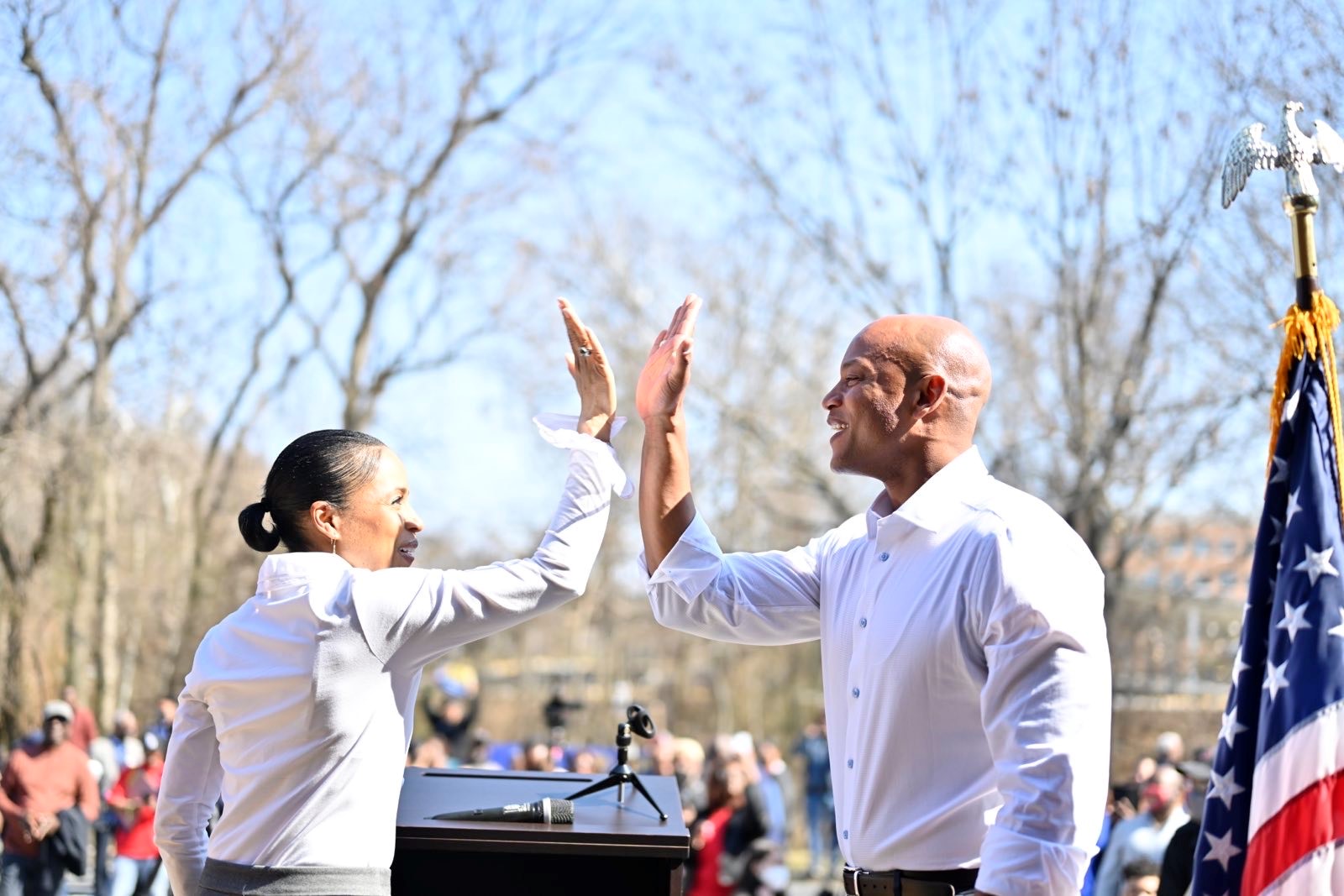After Leak of Draft SCOTUS Opinion on Abortion Rights, Maryland Lawmakers and Candidates Pledge Action

The U.S. Supreme Court ruling striking down a nearly 50-year-old right to abortion would lead to strict restrictions or bans by states across nearly half the country almost immediately, though not in Maryland, where lawmakers ensured abortion access in state law three decades ago.
A Democratic majority in the General Assembly approved the most sweeping changes to the state’s abortion access laws this year — including to expand access to providers and insurance coverage — though those efforts didn’t go as far as many lawmakers wanted. The House of Delegates approved a bill from House Speaker Adrienne A. Jones (D-Baltimore County) that would have enshrined abortion rights in the Maryland Constitution — creating a higher bar to overturn Maryland’s statutory protections — but the measure failed to advance in the Maryland Senate.
Jones vowed Tuesday to pursue the legislation again.
“Without federal protection of abortion rights, it’s up to each state to preserve the gains we’ve made toward equality for every American,” Jones tweeted. “Here in Maryland, I’ll continue to sponsor the Constitutional Amendment to protect a woman’s right to reproductive liberty until it passes.”
The draft opinion is not final, and could change before the court issues a ruling, but the revelation ignited a push among Democrats to codify abortion protections under federal law.
If made final, the court opinion would create a patchwork of legal abortion access across the country by leaving policymaking to the states, 26 of which are poised to ban the procedure immediately, or place severe restrictions on it, according to an analysis from the Guttmacher Institute, a pro-reproductive rights research group. Those states are concentrated in the South and Midwest.
Besides Maryland, six other states — including Colorado, New Jersey and Oregon — have enacted laws this year to protect abortion rights.
Congressional action promised — but will it be successful?
On the steps of the U.S. Capitol Tuesday, Senate Democrats condemned “right-wing justices” and vowed to bring a vote on the Senate floor to codify the abortion protections of Roe.
Sen. Benjamin L. Cardin (D-Md.) said Tuesday that Congress and the Biden administration should take “swift action” to create a “common standard for self-determination of health decisions for women and all individuals.”
“No level of government, whether federal, state or local, nor Congress, the President, or the Supreme Court, should interfere in personal health decisions,” he said in a written statement.
Sen. Chris Van Hollen (D-Md.), along with Cardin, is an original cosponsor of the Women’s Health Protection Act, which would codify abortion rights nationwide.
Van Hollen said Tuesday that Congress should move that bill or similar legislation quickly.
“I am determined to fight with everything we’ve got to protect reproductive rights in our nation. We must act immediately to codify Roe v. Wade, and we can’t let anything stand in our way,” he said in a statement.
Federal lawmakers on Tuesday also decried the Supreme Court nomination process that led to the court’s current conservative composition.
“Despite testifying before Congress under oath that Supreme Court precedents should stand, the recently appointed conservative members of the court arrived with an agenda to overturn Roe and now they are making that a reality,” Cardin said. “Senate Republicans bear responsibility for confirming justices far outside of the legal mainstream, as well as for changing the rules for considering vacancies after the death of Justice Scalia compared to the death of Justice Ginsburg.”
Senate Majority Leader Chuck Schumer, a New York Democrat, said Tuesday he plans to release a new bill this week that senators will vote on next week to codify Roe v. Wade.
But in the evenly divided Senate, it will run into problems getting past a legislative filibuster that requires 60 votes for legislation to advance.
Looking to the midterms
Democrats, who likely won’t have the votes to advance a bill in Congress, also predicted that abortion will emerge as a major issue in the upcoming midterm elections.
A Democratic strategist said Tuesday there are 81,000 Democratic women in Maryland who voted in the 2016 presidential primary but did not vote in the 2018 primary for governor or the 2020 primary for president. The strategist suggested that at least some of these women, who likely were supporters of Hillary Clinton for president, may feel compelled to turn out this year in response to the anticipated erosion of abortion rights.
But a potentially bigger draw to the polls on the issue — from voters on all sides of the political spectrum — failed to pass in Maryland this legislative session.
The House of Delegates passed a proposed ballot referendum, introduced by the speaker, that would put a question on the 2022 general election ballot asking voters whether they want amend the Maryland Constitution to include the right to access abortion services. But the bill stalled in the Senate Finance Committee.
Senate Democratic leaders, at various times this year, suggested that they did not move the abortion referendum bill because they did not want to tie up the Senate floor in the final days of the legislative session with a possible Republican-led filibuster. Some privately warned that there might not be the votes in the Senate to pass the measure.
Either way, it’s apparent that some Democratic senators did not want to have to vote on the constitutional amendment legislation in an election year.
Under the long reign of Ferguson’s predecessor, the late Senate President Thomas V. Mike Miller Jr. (D), the Senate frequently attempted to side-step controversial votes if they potentially caused political hardship for Democratic senators —particularly those serving in conservative districts.
Ferguson did not address the decision not to move forward with a vote on the proposed referendum in a statement on Tuesday.
“This session, the Maryland General Assembly passed the Abortion Care Access Act to ensure safe, equitable, and thoughtful access to reproductive care,” Ferguson said. “Although the regressive policy actions and rhetorical discussions at the national level are harrowing, we in Maryland have long stood for women and their right to make the best medical decisions for themselves and their families. We will continue to protect this right.”
Del. Ariana Kelly (D-Montgomery), lead sponsor of the Abortion Care Access Act, said the draft Supreme Court opinion could put more pressure on Maryland’s abortion provider network.
“This is what we were preparing for all session — coming up with legislation to protect Maryland women’s access to care while also preparing ourselves for an increase in patient load [from] out of state,” Kelly said in an interview.
The General Assembly overrode Republican Gov. Lawrence J. Hogan’s veto of the Abortion Access Care Act, which expands who can perform abortions and expands insurance coverage. The law also earmarks $3.5 million in the state budget to train providers who attend medical schools in other states that do not train them to perform abortion procedures.
“We had to fill that gap or else we were going to see a real workforce shortage,” Kelly said. Maryland is the first state to allocate funding to train clinicians who want to provide abortion care, according to Kelly.
“One small glimmer of hope is that Maryland passed this legislation and showed support for our provider community, for our patients — I’m glad that we did that because it’s going to be a tough road ahead and it’s nice to be starting from this place,” Kelly said.
Sen. Sarah Elfreth (D-Anne Arundel), a supporter of abortion rights, said that the recent draft Supreme Court opinion marked a “dark time in our nation,” but praised the bill that lawmakers passed this year.
“I’m happy that we took that preemptive move forward, but it’s unfortunate that it was needed,” Elfreth said.
When asked why the Senate chamber did not take up the ballot referendum, Elfreth said she could not speak for the Senate, but the most immediate issue this year was to expand access to abortion care and both chambers were united in that.
“This is going to be a never-ending battle, unfortunately. It’s not a one-and-done — we pass the bill and walk away. There has to be a concerted effort moving forward,” Elfreth said.
Kelly said she expects an abortion rights referendum to pass out of the House of Delegates again next year. She said the Senate had a “narrower pro-choice margin” than the House, which could change after the 2022 elections.
“If a Maryland resident is concerned about abortion rights, then they need to make sure that we have a strong pro-choice majority in the Maryland Senate,” Kelly said. “Every vote counts if we want to pass that constitutional amendment.”
On the campaign trail
Maryland lawmakers and political candidates were among the crowd that gathered outside the Supreme Court late Monday and throughout the day Tuesday.
Katie Curran O’Malley, a candidate for Maryland Attorney General, recorded a video from the rally.
“Today is a shockingly dark day in our country’s history,” she said in a statement. “…As Maryland’s first female Attorney General, I will never waver in my fight to ensure that our laws protect a person’s right to choose. I will make Maryland a safe haven for individuals seeking abortion by expanding reproductive rights access and advocating for a state constitutional amendment to guarantee abortion.”
Rep. Anthony Brown (D-Md.), who is also running for attorney general, tweeted that policy makers need to “act now to defend women’s rights and health care.”
“We need to codify Roe in Congress, now. We need AGs to take up the cause, now,” he wrote. “Maryland needs to hold strong for women, now. Maryland law protects a woman’s right to choose and I will fight to protect it.”
Several Democratic candidates for governor issued statements Monday and Tuesday condemning the draft opinion.
“It cannot be overstated how many people will die as a result of this decision,” Democrat Wes Moore said in a statement. “This is precisely why, if I am elected governor, I will fight to defend Marylanders’ right to access safe and legal abortions — including through constitutional amendment — and oppose any efforts to restrict access to reproductive care in Maryland.”
Former Attorney General Doug Gansler (D) promised to be a “brick wall against any attack on women’s reproductive rights” and said he would work to help women from other states come to Maryland for care.
His running mate, Candace Hollingsworth, who worked as a counselor to women seeking abortion care said her own path “would be drastically different without the access to abortion services.”
“The United States should stand as a beacon of hope for freedom and that includes — unequivocally — reproductive freedom, and it would be a catastrophic failure for [Roe vs. Wade] to be overturned,” Hollingsworth said in a statement. “This is an example of why local leadership matters, and in Maryland, why it’s all the more important that the state is led by those who value the voice and the autonomy of women.”
Comptroller Peter V.R. Franchot (D) tweeted that Maryland needs to push back against attacks on reproductive rights and pass an amendment to the state constitution.
“As Maryland’s next Governor, I will strongly oppose any attempts to roll back reproductive rights,” he wrote. “I’ll work hand-in-hand with activists, allies, and fellow elected officials to ensure that Maryland will forever remain a state which protects a woman’s right to choose.”
Jon Baron also called for a constitutional amendment. Ashwani Jain tweeted that he would ensure “full access to reproductive justice” in Maryland, which would be an “abortion sanctuary.”
Tom Perez said Maryland should establish a constitutional protection and become a sanctuary to people seeking abortion care, in addition to taking other actions.
“As governor, we can ensure that everyone can access to safe and affordable reproductive health care by integrating reproductive services into primary care, increasing the number of trained abortion providers, and providing equitable access for coverage,” he tweeted.
The Democratic ticket of Rushern Baker and Nancy Navarro issued a joint statement: “A woman’s right to choose is sacred and must be protected at all costs. This decision may be the majority opinion of today’s Court, but it is not the majority opinion of our country, and certainly not that of Marylanders. Should this opinion go into effect, our administration will guarantee that anyone seeking care in our State will be able to receive it.”
Former U.S. Education Secretary John King organized a 30-minute Facebook Live chat on Tuesday morning, saying that securing the right to abortion in Maryland’s constitution is at the top of his agenda.
“We’ve got the statutory right, but we can’t take for granted that our legislative body won’t change in some ways — statutes are very easy to overturn,” said Michelle Siri, a women’s rights advocate and King’s running mate.
As a first generation Iranian American, Siri said that she was raised with a “backdrop of how fragile our women’s rights are,” which propelled her into a career advocating for women’s rights.
The anticipated Supreme Court ruling to end a half-century guarantee of federal constitutional protection of abortion rights shows that “elections matter,” Siri said. “We need to make sure that we are not taking our rights here in Maryland for granted.”
Since this was a draft Supreme Court decision, there is still an opportunity for people to organize and demand Supreme Court justices to do something different, King said, urging Marylanders to participate in protests in favor of abortion rights and “vote like we’ve never voted before.”
The court is expected to release its official ruling in the case, Dobbs v. Jackson Women’s Health Organization, within the next two months.
Josh Kurtz, Ariana Figueroa, Jacob Fischler and Jennifer Shutt contributed to this story.





 Creative Commons Attribution
Creative Commons Attribution